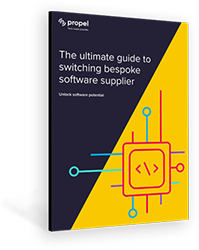07/02/2024
Weighing up the benefits of a software supplier shake-up
Moving bespoke software suppliers can feel like a big task, it can have both pros and cons, and the decision should be carefully considered based on your specific circumstances and goals.
We spoke to clients across sectors from manufacturing to facilities management and have compiled a list of some of the most recognised pros and cons of changing bespoke software suppliers:
PROS:
Improved functionality: A new supplier should conduct a full audit of functionality. Given the drive to change suppliers of often driven by the lack of the right skills and a system not performing as it should, onboarding a new partner should result in significantly improved functionality linked to the new supplier's expertise and experience. What's more, they should bring fresh ideas and approaches to improve the functionality of your system, leading to enhanced user experiences and productivity.
Better support and maintenance: If your current supplier is delivering a poor standard of support or maintenance services, a change would lead to improved responsiveness and reliability, ensuring your system runs smoothly. Setting out support expectations and SLAs will help to ensure that support is at a level that you require and your new supplier is delivering to your required standards and hopefully delivering proactively to your needs.
New ideas and up-to-date technology: A new supplier should bring new ideas and approaches, along with more detailed or specialist expert knowledge, that can support the modernisation of existing systems and ensure that where required they are recommending and utilise more advanced technologies, helping you stay up-to-date with the latest industry trends and best practices.
Scalability: If your current supplier struggles to scale the system with your growing needs, a new supplier should be fully briefed as to the scalability requirements. As part of the discovery process, a plan for the scalability of technology to support your business should be made based on your required time frames, be this six months or five years. A new supplier should be expected to bring a clear and scalable approach that plots the current and future relationship from that start - this allows both parties to scale and ensure that they can flex to provide a solution for your business technology needs and future expansion.
Cost efficiency: A common reason for switching to a new bespoke software supplier is often the hope that it will lead to cost efficiencies, however, if your software has been poorly managed or badly neglected for several years, there will be a cost to bring the system up to its optimum efficiencies. An efficient system in the long run will deliver you cost savings in the long term across the whole business - moreover, a more efficient, productive and effective system, saves manual time, improves processes, removes the chance of errors and supports long-term improved technology ROI.
CONS:
Transition costs: Moving to a new supplier can involve substantial transition costs, such as data migration, training, and customisation, which might temporarily offset the potential benefits. These costs need to be carefully planned and managed to ensure that, in the long term, the migration will deliver wider business returns.
Learning curve: Change in a business is not always easy to manage. Getting a new supplier onboard is a hearts and minds exercise and it requires a learning focus and an appetite for change. Switching to a new supplier may require time from employees to pass knowledge on, potentially causing a temporary decrease in productivity.
Disruption to business: During the transition period, there could be support or platform-related disruptions to your business operations, affecting customers, partners, and internal workflows. Planning possible disruptions in advance with scenario planning and getting the right members of the team involved can help mitigate business disruption.
Unknown supplier performance: With a new supplier, you might encounter unforeseen issues with their reliability, responsiveness, or the quality of their software and support. Any concerns about performance can be headed off with clear SLA’s from the outset.
Contractual obligations: Depending on your current contract with the existing supplier, there could be penalties or legal issues related to terminating the agreement prematurely. Getting a clear view of contractual obligations and negotiating at the start ensures everyone is clear about what their obligations are. To make an informed decision, thoroughly evaluate the potential benefits against the associated costs and risks.
Consider conducting a thorough analysis of your system's current performance, setting objectives and getting feedback from all possible stakeholders, the capabilities and reputation of the new suppliers, and the impact on your organisation during and after the transition process. Additionally, involve relevant stakeholders to ensure alignment with your company's goals and long-term strategy.
“When we were looking for a technology partner to support and enhance our business-critical systems we were initially nervous about the cons of migration, however Propel Tech quickly impressed us with their professionalism, efficiency, ideas, knowledge of required technologies, smooth supportive processes, and excellent communications. We are thrilled to be working with Propel on continuous system improvements.” Lukas Fabricius - Business Development Support - SAV Systems
Make successful provider migrations a possibility - download our complete essential guide here.

eBook
Make successful provider migrations a possibility. Download our essential free guide.
Find out more





